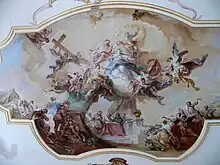Johann Wolfgang Baumgartner
Johann Wolfgang Baumgartner (1702 in Ebbs, Tirol - 7 September 1761 in Augsburg) was an Austrian-German Rococo painter.
Johann Wolfgang Baumgartner | |
|---|---|
| Nationality | Painting |
| Style | Rococo |

The Prodigal Son Living with Harlots by Johann Wolfgang Baumgartner

The Assumption and Crowning of Mary, painted ceiling in the transept of Baitenhausen church, 1760
Life
He was born Johann Wolfgang Baumgartner in Tyrol and he learned glass painting in Salzburg. He moved to Augsburg and worked as a glass painter. The ceiling painting in the Sanctuary of the Holy Cross of the former Klosters Mountains is considered as his largest and most important work.[1]
Works
- Ceiling frescoes of the Sanctuary of St. Mary of Mount Carmel in Baitenhausen in Meersburg on Lake Constance, 1760
- Ceiling frescoes in the nave of the Sanctuary of St. Maria Loreto in Westheim
- The Martyrdom of St. Venantius of Camerino
- Daily edification of a true Christian
- Mark the Evangelist writing
- The Holy. John I. and the Gothic King Theodoric
- Drawings of Bible pictures in Historia veteris (ac novi) Testamenti Iconibus Expressa
References
- "Baumgartner, Johann Wolfgang". Oxford Art Online. – via Oxford Art Online (subscription required) . Retrieved February 4, 2016.
Further reading
- Bruno Bushart, Friedrich Kaess: monastery Bergen Neuburg an der Donau and its frescoes by Johann Wolfgang Baumgartner . 1981
- Peter Stoll and Heide-Maria Krauthauf: "Johann Wolfgang Baumgartner and the 'Holy Albert of Trapani' in the former Carmelite Schongauer". In: The Welf: Yearbook of the Historical Society Schongau - town and country 10 (2008/09), S. 177-194.
- Peter Stoll: Anton Winter Gerst copied Johann Wolfgang Baumgartner . University Library, Augsburg 2013 (full text)
This article is issued from Wikipedia. The text is licensed under Creative Commons - Attribution - Sharealike. Additional terms may apply for the media files.